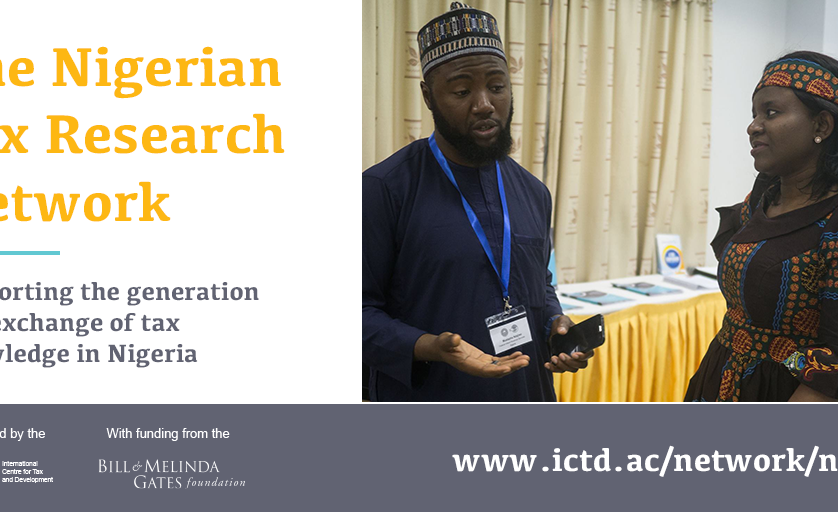The Nigerian Tax Research Network (NTRN), in partnership with the International Centre for Tax and Development (ICTD) and the Federal Inland Revenue Service (FIRS), offer an enhanced programme of research capacity-building for researchers on tax and revenue outside of established academic high-level career paths. The programme will consist of seven modules spread throughout a year taking researchers all the way from concept and research design, through methods, writing, publication to the dissemination of outputs. Successful applicants are expected to complete all seven modules, which will be run over a period of one year. All selected applicants will have travel and residential costs fully funded, however PLEASE NOTE that ICTD/NTRN/FIRS will not subsidise your research and fieldwork costs.
Duration of the course: 1 year (18 days of physical attendance)
Location of first two modules: Abuja, Nigeria
Participant places: 15
Fees: Successful applicants will be fully funded
Application deadline: 6 November 2019
Entry Requirements
- Completion of the online form
- A 1-2 page research outline or proposal emailed to [email protected].
- Applicants should be Nigerian nationals.
- Applicants should be proficient in English and be able to follow and take an active part in the discussions.
- Applicants should possess basic computer skills
Course Structure
The course is structured around seven modules with three main deliverables: a revised research proposal, a detailed outline and a working paper. Participants will be paired with mentors who will support them in developing their ideas and provide them with feedback on their papers. Successful completion of the program, including writing a publishable research paper, will depend significantly on the personal drive and commitment of participants.
Course Outline
The course is divided into seven modules, run over a period of one year.
Module 1: Identifying and defining research projects: 2nd to 4th December 2019
- Asking relevant and feasible researchable questions
- Thinking about a suitable research design
- Identifying data needs and suitable methods of collecting data
- Matching your research design with your research question
Module 2: Connecting empirical questions with theory and literature: 2nd to 4th December 2019
- How to conduct a focussed literature review and build a conceptual framework
- Identifying the size and quality of already existing literature/evidence
- The importance of bridging the gap between the world of policymakers and researchers
- Research ethics
- Key criteria for evaluating policy reforms and administrative initiatives
- Using pilots and incorporating data collection and evaluation in new initiatives and reforms
Deliverable 1: Research proposal – After the first two modules, participants will be required to submit a revised research proposal that incorporates the lessons learnt.
Module 3: Qualitative methods – 3 days (Dates to be confirmed)
- How and when to use case studies
- Designing and conducting interviews
- Designing and conducting focus group discussions
- Process tracing
Module 4: Surveys – 3 days (Dates to be confirmed)
- How to design surveys
- Sampling strategies and the importance of randomization
- How to collect data
- Coding survey data
- Analysing survey data
Module 5: Setting up large datasets and organising information – 3 days (Dates to be confirmed)
- Administrative data sources and data quality
- STATA basics
- Organising and coding quantitative information
- Basic descriptive analysis
- Data visualisation
Module 6: Quantitative Methods – 3 days (Dates to be confirmed)
- Causal effects and the selection problem
- Randomized controlled trials
- Regression analysis and matching
- Instrumental variables
- Regression discontinuity designs
- Panel, difference-in-differences
Deliverable 2: Qualitative or quantitative analysis. Participants will submit to their mentors and course convenors a draft outline containing a refined research question, preliminary literature review, methodological approach and preliminary findings. These drafts will be discussed with mentors who will provide feedback on the way forward.
Module 7: Communicating research findings and writing an accessible paper – 2 days (Dates to be confirmed)
- Research ethics
- Writing an academic paper
- Articulating the policy relevance of your research
- Publishing your work
- The peer review process
- Writing policy briefs and blogs
Deliverable 3: Submission of working papers. Participants will submit their full working papers. The working papers will be reviewed by ICTD researchers and other researchers in the ICTD network, who will provide feedback.
How to Apply
- Please send your research outline or proposal to [email protected] and complete this online form by 6th November 2019
- Successful applicants will be contacted by 18th November 2019
